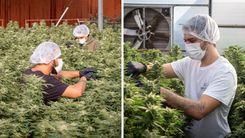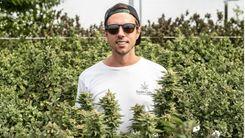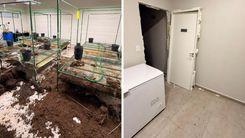“Point of no return”: research networks strengthen and await approval to cultivate with cannabis
For Fritz Eduardo Kasbaum the scientific ecosystem is ready to expand, but still depends on changes in national regulation
Published on 11/10/2025

"The networks have been preparing for this moment. The effort has to be joint, because it is a very complex, multifaceted topic, but the initial step has already been taken," says Fritz Eduardo Kasbaum, Scientific Manager of FAPEG. Illustrative Image: Can
Research networks are in full articulation, seeking partnerships and preparing for a scenario of cannabis expansion in Brazil. These collaborative groups, which combine competencies for common goals, face, however, a central obstacle, the lack of regulation that allows planting for research purposes in many regions.

The assessment comes from Fritz Eduardo Kasbaum, Scientific Manager of the Research Support Foundation of the State of Goiás (FAPEG). During the 4th Brazilian Medicinal Cannabis Congress, the specialist identified a clear movement of preparation of research groups for what is to come.
"The networks have been preparing for this moment. The effort has to be joint, because it is a very complex, multifaceted topic, but the initial step has already been taken," he says.
Kasbaum emphasizes the importance of multidisciplinary collaboration. "Today we see the movement of the Executive Branch. Research groups are interacting with each other and with the productive sector, seeking alternatives." He also mentions interaction with "entrepreneurs, with other professionals who are also necessary, such as lawyers, regulatory affairs specialists."
For the FAPEG manager, the expansion of plant use is an inevitable reality. "It's a point of no return. This topic has gained a lot of notoriety and soon we will have cannabis, not only in the medicinal field, but in different fronts," he opines.
The bottleneck of Research Networks
Despite the optimism and articulation of the ecosystem, the main obstacle to sector development is regulation. Kasbaum uses the state of Goiás as a practical example of this bottleneck.
"In Goiás there are excellent researchers, qualified in plant production, genetic improvement. Goiás is a very agro-oriented hub, so it has cutting-edge researchers," he points out.
"But Goiás does not have, universities do not have authorization to be able to plant," he laments. The impact of this limitation is direct on the innovation chain. "If you don't plant, you don't research genetic improvement, you don't develop a product," explains Kasbaum.
"So, I think that this regulatory evolution and permission, even if gradual, initially for medicinal purposes, will soon open up a whole range of possibilities," he concludes.
Promoting cannabis research in Goiás
In Goiás, FAPEG has been proactively working to structure the local ecosystem. Kasbaum cites the launch of a call for research on cannabis as a "success story" that allowed the foundation to identify and mobilize the state's researchers.
"From this call, we were able to map the research groups in our state and with this mapping we are now creating a network. Probably the Goiás medicinal cannabis network," he reveals.
The call in question (nº 24/2024) allocated over R$ 730 thousand to finance 14 innovative research projects on the therapeutic use of cannabis.
The selected proposals, coming from institutions such as the Federal University of Goiás (UFG), Federal University of Jataí (UFJ), and Goiano Federal Institute (IF Goiano), cover everything from cultivation techniques and clinical formulations to the analysis of legal and social aspects, aiming to strengthen cannabis research networks.
Embrapa also mobilizes
The movement seen in Goiás reflects a national trend, in which the Brazilian Agricultural Research Corporation (Embrapa) emerges as a heavyweight player. The institution, linked to the Ministry of Agriculture, also identified regulation as the main obstacle for Brazil to use its agricultural potential in the sector.
Recently, Embrapa formally requested authorization from the National Health Surveillance Agency (Anvisa) to start its own research with the plant. The goal is to create a germplasm bank to study the adaptation of different cannabis varieties to Brazilian soil and climate.
At the same time, Embrapa has been actively involved in regulatory discussions, especially for industrial hemp. The company has established strategic partnerships, such as the agreement with The Green Hub and the Instituto Ficus, to boost research and regulation of hemp.
Together, the institutions presented a document proposing regulatory advances, including updating Ordinance 344/1998, to structure the productive chain in the country, in line with decisions of the Superior Court of Justice (STJ), setting a deadline for medicinal cultivation regulation by March 2026.







